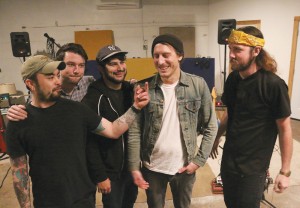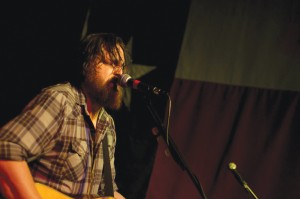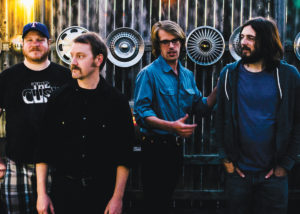Caviar Dreams
Fort Worth has never lacked for buzz bands that are permanently on the cusp of breaking out –– whatever that means in our post major-label/terrestrial-radio-controlled world. But, until recently, few bands ever crossed over into the national consciousness. Fort Worth Weekly associate editor Eric Griffey sat down with three guys who front bands that are either currently or have teetered on the edge of something bigger than just being a great local band: veteran roots rocker Kevin Aldridge; Seth Reeves of the Band of the Year-nominated Siberian Traps; and Cameron Smith of War Party, whose latest, To Love and Fear It, is up for Rock Album of the Year. The trio discussed how to go from the bottom to the top (but hopefully not back down again).
Weekly: We’re trying to define tiers of success. There’s a certain point –– maybe it’s once you’ve headlined Lola’s [Saloon] or Shipping & Receiving on a weekend night and done some touring –– that a band plateaus. How do you break through to that next level? What is that next level?
Cameron: How are we defining success?
Kevin: To me, success is: I wrote the best song for me. That’s how I’d define it.
Seth: At the end of the day, they have to be songs that you can listen back to and say, “You know what? I can live with that and be really proud of it.” And also I think the performing them has to remain relevant and vital.

Cameron: You two front a band, and so do I. So all of us are talking about this as songwriters, but all of the musicians in my band might consider success as if they were allowed to do nothing but play music, not necessarily have a ton of money but pay the bills and just do that.
Kevin: It’s hard to take that into consideration when you write songs. I’m fortunate. I play with a bunch of guys who just want to play shows and play songs that we love and do it really well.
Cameron: It’s not just playing what we want but having other people [dig it]. If it were just about writing good songs, we’d all just be playing it to ourselves in our bedrooms.
Seth: You seek the audiences’ feedback. If we’re being honest, as much as you say it’s just about writing a good song, we’re all playing shows and want people to hear it.
Weekly: So why tour? Why do social media? Why get a manager?
Cameron: It’s not even about how you become rich and famous. It’s more like, “At what point do I start getting paid to do what I want to do?” From a songwriter’s point of view, the thing that made me want to become a songwriter was hearing a song that I connected with. The idea of touring, social media is to go out and find people like you [who will appreciate your music].
Weekly: Lots of bands tour, do social media, et cetera. But how to you get to that point? If you’re defining success as just being able to fund your life, how do you get there?
Kevin: I do not give a fuck who likes my stuff. I’m probably one of very few people who do not care. I played with a guy who is a very successful, smart person, and he told me, “A lot of people can like it and not get it, and a lot of people can get it and not like it.” For me, personally, any stepladder just consists of doing your thing, stay on your own page, and work hard. That works for me. Listen to people, but you have to do your thing and work hard.
Cameron: In some ways these same platforms that people typically use … these days it can be just as beneficial not to use them. It’s a point of interest for people. Their lack of social media presence becomes a selling point.
Seth: You’re bucking the trend. If you want to talk about the material side, at a certain point you can do one of two things, and I’m not disparaging either approach: You can play a lot of shows in your local area. You can play for three hours and play a bunch of covers and stuff. And that’s fine. If that’s where your bread is buttered. Or … at a certain point, you have to get out of town. You have to play in other cities, tour, and take your music to a wider audience. It’s impossible, as I see it, to make money off of album sales. People just see music as a free commodity. Hopefully that will change at some point, because I think that’s unfortunate. If you’re going to try and support yourself, touring is the way to go. And that’s a rough life.
Cameron: You’re absolutely right. If you’re going to fund yourself at all, it’s going to be playing shows and what you make selling t-shirts.
Kevin: It’s always been that way. [Major-label bands] don’t make money off of album sales. Even the bigger indie bands hope they sell a few shirts.
Cameron: People are just going to find your music online and download it.
Kevin: What my band has done … we just release singles. … I started thinking about how radio works. You release a 10-song record, you send it to whomever, and they play one song. You call them two months later to play your second single, and they say, “Yeah, buddy. We worked your record. Done.” So we released a single in October, and it got some play. We released one in January, and it got some play. And they are still playing the one from October. It was just dumb luck that it worked out that way. I didn’t just shoot my wad on one record. We started making the single releases more of an event. We always do the release parties at a place with a built-in crowd. We usually play the Chat Room. When you play there, you’re definitely playing a home game. … The next level for us is just better shows. That’s fine for us. We don’t have the same aspirations as other bands.
Seth: We’re going on tour on Sunday. And this is the first time I’ve ever been on the road seriously. We’ve done one-off shows here and there. But everyone’s situation is different.
Weekly: Seth, you have a career. Why go on tour? Why book a tour?
Seth: It’s fun. It gets our music out to a broader audience. The going out itself is worth doing if you can.
Cameron: I have a question. Would you have to be making the same amount of money that you’re making at your job right now with music to quit your job?
Seth: It would have to be in the same range.
Cameron: But you’d take a little less, right?
Seth: Yeah, I’d take less.
Cameron: I would definitely take less. … How much would you be willing to tour?
Seth: That’s tough to say.
Cameron: Because you have a family?

Kevin: I don’t have a family, but some of my band members do. I’ve never had any constraints. Those kinds of things come up, though. I’ve booked all of my own tours, and I’ve done a lot of touring. I’m writing the best songs of my life, and I’m not touring now.
Cameron: The first tour I ever booked, we were playing a show every night. We made money, but my relationship with the band was never the same. You can’t practice twice a week anymore after that. No one wants to feel like it’s a job. They don’t want [music] to be their job, but they want it to be their work. And they want to be paid for their work. Even if you’re only playing to 15-to-30 people, maybe that’s a good thing. It’s still the feeling that this is helping, with the idea that maybe I can eventually just do this [for a living].
Weekly: When you look at guys like Leon Bridges, Luke Wade, The Toadies, do you ever get starry-eyed about that level of success? Are you motivated to try and break into that echelon of stardom?
Cameron: I started out playing punk bands. It would bother me to do what [Leon] does. I see him when he comes home now. For a few months, he was trying to live the way he used to live. That would stress me out. I would be totally fine being more like a Chris Johnson or someone like Jordan Richardson, who can do things like play with Ringo [Starr] or Robert Plant and still live your life without people harassing you. [Leon is] living off of what he makes. Sure, you’re not wearing Ray Charles’ jacket in front of the president, but who would want to do that? I think it’s amazing to see someone I love and have known for some time get to do it.
Weekly: Let me just throw it out there again: What is the next tier? How do you go about getting to the next tier? If you’re not interested in that, then why are you going about things the way that you have?
Cameron: I look at it like it’s my work. The idea is that you want to do good work and always make it better. I want to make sure that I eventually make some sort of masterpiece. It’s not important for me to be some kind of cultural icon. It’s terrifying to me. The reason I perform is to reach out. The next tier for me is where my voice is distinct and isn’t just like something I’ve heard. I want to break off into new territory. That’s why I’m constantly grinding at it.

Seth: For me, you don’t just do it for yourself in your bedroom. You want other people to hear it and see what their reactions are –– at least I am. But to me the primary responsibility is to the song and the people who I play with. For me, someone on the cusp of releasing a new record, I’ve already written another half of an album. The songs that I’ve written for the next record, I’m even happier with. I’m a slow rider, and I’ve written half an album in a year since [drummer] Ben Hance joined the band. I might end up sounding like a walking cliché, but there isn’t an endpoint to it. You keep pushing yourself, keep looking ahead and exploring new possibilities, because what’s left of a man once the work is done?
Kevin: I had a situation when I moved back. My band was on the cusp of … things going to happen. And they didn’t happen. We didn’t know why. The whole time I was still writing songs. I feel like I’ve kept that same mindset. In the last few years, I’m the happiest I’ve been with the people I play with. The next-level thing is great. We would all love to be able to do music. I would love to be able to write songs for other people. I’m OK having my job and playing shows. It’s a beautiful thing to be able to write more songs. We’re basically two generations removed from when I started. It’s basically down to me and Carey Wolff from that era. The best thing about our scene now is that there are more places to play and more people to come see it. That’s the thing that pissed off people the most for the last 20 years. People who complain about it now are out of their fucking minds. There are more bands, better songwriting, better singers, and better players. The money isn’t huge, but I don’t care about that. The bands love each other. And there’s so much to be said about that.
Hall of Fame
Casual music fans might not recognize the name, but any musician who has played at Billy Bob’s Texas in the past 30 years is fondly familiar with Robert Gallagher. The recently retired Fort Worthian had a job that is both demanding and fun, invigorating and exhausting –– playing backstage nanny to musicians. As entertainment director at the World’ Largest Honkytonk, Gallagher did a little of everything, from booking top stars of the day at a venue not exactly known for its sterling acoustics, to fetching artists at airports, to buying popsicles for Gary Stewart, to taking David Allan Coe shopping for his first pair of tennis shoes. Gallagher has seen more than a few stars at their worst but doesn’t blab about it to news media –– another reason he is so beloved by musicians.
The late Harlyn Hill was hard to miss. The hulking mass of a man gained scene cred by working security at the Engine Room in the mid ’90s. After the place closed, Hill and local music pioneer Kelly Parker eventually opened The Impala, which was the only club in town then that booked road shows and gave original rock bands a place to grow. (The Wreck Room opened just a year or so later.) Hill broke away from the Impala to open Club Nowhere in the space now occupied by The Chat Room Pub. His was one of the first businesses on the then-skuzzy West Magnolia Avenue. Harlyn will be remembered for his love of music and community just as much as his smart-alecky smirk.
Nevada Hill was a driving force in a number of scenes, not only in North Texas but all over the world. His passion for intense and experimental music and performance allowed him to make art all across the country and even led to a residency in Portugal. He flowed effortlessly through music, mostly through his exceptional noise-rock outfit Bludded Head, and visual art and often interweaved the two. Simply put: He played until he couldn’t play anymore.
One of the nicest guys in the local scene, Rockin’ Ron Thompson is fondly remembered for his many years spent drumming with the Bugs Henderson Group. The Fort Worth native kept the steadiest of beats for many artists over the decades, including Tommy Alverson & The Sidemen. Thompson died in February at 65.











